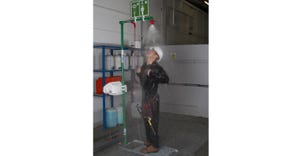Factors That Affect Selecting a Diverter for a Pneumatic Conveying System
June 4, 2010
|
Jason Marcotte |
Jason Marcotte
[email protected]
The selection of a diverter valve for a pneumatic conveying application can be a difficult task, especially when considering the different designs and manufactures available in the market. Proper application and selection of a diverter valve will offer improved plant efficiency and add to the company’s profits, while reducing downtime and maintenance costs. There are five main factors to consider when choosing a diverter. These factors include system design, material handled, dilute- vs. dense-phase pneumatic conveying, safety, and cost.
System design will impact diverter selection for many different reasons. First, air and material leakage past the diverter will affect system capacity and blower line size calculations. Secondly, the space constraints the system is being designed around can be influential on the diverter size or “footprint” that is available. Whether the diverter can be placed in a horizontal or vertical convey line will also affect selection. The type of temperatures the valve will be exposed to in the system, based on locale to other equipment, will be another important system factor. Finally, whether the valve is located inside or outside of the plant can impact the decision.
Next, the characteristics of the material being handled must be addressed. These material characteristics include, but are not limited to: particle size, weight, hardness, abrasiveness, and flowability. Other material questions that need to be asked are: Is the material hygroscopic, sticky, or tacky? Does the material pack or buildup? and What is the temperature of the material being conveyed? Addressing these material issues allows for the selection of a diverter valve with features designed to handle the specific application requirements.
The third factor is whether the pneumatic system is a dilute- or dense-phase conveying system. Dilute phase is defined as conveying line pressures to 15 psig/1bar while, dense phase is pressure to 90 psig/6 bars. Each manufacturer will pressure rate their particular diverter design.
The next feature that should be discussed is safety. No matter which diverter valve is chosen for an application, make sure individual safety features are in place for each valve used. A vented ball valve should always be installed within a foot of the air cylinder for pneumatically actuated valves. It should be used to shutoff the air power source prior to valve cleaning, repair, or standard maintenance. It is also important to ensure the diverter valve design shields all moving parts to eliminate any potential pinch points. The final aspect to consider is cost. Many times, the purchase price of the valve is the only cost that is considered. There are several other costs associated with diverter valves that should warrant consideration. The first is installation costs. These can escalate based on the weight of the valve, flange connections, and whether the valve can be built as a direct replacement for existing equipment. Maintenance cost should also be considered during the selection process. If the diverter valve cannot be easily maintained or serviced, it will result in lost production time. Therefore, not only can the labor cost add up but also the cost of lost production due to downtime.
In closing, choosing the proper diverter valve for the application can substantially increase efficiency and is critical to achieving optimum performance in any pneumatic conveying system. Without the supplier properly identifying the unique needs of the diverter valve in an application, it can impair the pneumatic conveying systems ability to function appropriately. Ultimately, there is not one manufacturer that has a solution for every diverting requirement, so it is important to consider all the significant factors before you select which diverter is right for the pneumatic conveying system.
Jason Marcotte is VP of North American Sales at Vortex Valves. He has served the dry bulk solids industry for more than 10 years.
You May Also Like



